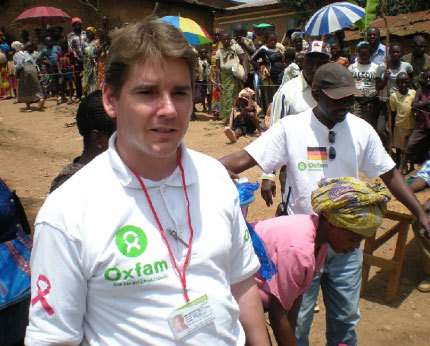Below is a blog from the Head of Oxfam in the DRC, Marcel Stoessel
This afternoon I'm supposed to be attending a meeting with the US Secretary of State Hillary Clinton, who flew into Congo last night. She's here to meet victims of sexual violence from the conflict in the east of the country, and to work towards solutions for ending Congo's rape crisis. She couldn't have picked a more appropriate time. Rape is widespread here, and cases have increased dramatically in the past few months.
I remember a woman I met in the remote Lubero territory of North Kivu Province. She told me she witnessed a gang rape of another woman by three armed men. It is almost impossible to describe the scenes she told me, but she was so brutally raped that she later died of internal bleeding. The witness, the woman I talked to, fled the area in terror. So did thousands of other unnamed victims in the past few months. This terrible story happened in a very remote area of eastern Congo, an area Hillary Clinton will not visit today, and an area where UN-backed military operations are ongoing. The perpetrators are often part of an illegal armed group, but equally often they are part of the Congolese army, supported by the UN, which is in turn supported by the US government. They are likely never to be punished. I wish I would be able to relay that story directly to Hillary today, and I am sure she would be as revolted as I was and think the same as I do: that men who commit such abuses, whether they are FDLR rebels or members of the Congolese army, should not get away with it. They must know that one day they will be punished and that justice will come to Congo. Oxfam staff recently conducted a survey of almost 600 civilians in North and South Kivu Provinces. Every single community we spoke to was terrified, and more than half said rape has increased since January, when new military operations began. Thousands of women have been raped since, civilians told us. The recent phase of these operations, known as "Kimia II", is now being supported by the UN Security Council and MONUC, the peacekeeping force, which is deployed to protect civilians. Kimia II was supposed to target the FDLR rebel group -- which has been responsible for horrific attacks on civilians -- and make life better for these communities. But so far, the offensive has had the contrary effect, and rape has surged as a result. Villagers have told Oxfam staff of children as young as four, and even men, also being raped. Many of these rapes are committed by the FDLR, but more than half of the rapes reported in North Kivu were attributed to elements of the Congolese army. If Hillary Clinton asks me what she can do to reduce rape in eastern Congo, I will tell her first of all that the US government, and the rest of the international community, needs to urgently rethink its support for an offensive that has -- according to UN figures -- forced more than 800,000 people to flee their homes, and has resulted in rape cases spiralling out of control. The military option must not be the only strategy. It is always the civilians -- the women, children and men of Eastern Congo -- who pay the highest price for any military operation. But ultimately, the thousands of rape cases in Congo are symptomatic of wider problems: Years of conflict; an undisciplined national army which has not been paid for months; and rampant impunity which sees rapists and attackers rarely if ever brought to justice. The US and others must help establish a political process to address the root causes of the conflict. They must also pressure and support the Congolese government to comprehensively reform its army, police and judicial institutions. I had the privilege to meet the DRC President, HE President Kabila, in March. He was very open to hear the stories of ordinary civilians, stories that are possibly not always reported to him through his own channels. The president seemed thoroughly committed to ending impunity in his security forces. He told our delegation about the new "zero tolerance" policy for any kind of sexual violence in the ranks of the security forces. Hundreds of thousands of people hope that this policy will turn into reality, although so far only a handful of perpetrators have been arrested. But a long way starts always with the first steps. I hope that Secretary Clinton will support President Kabila in the implementation of this policy. I hope she will also make sure that the UN Security Council, of which the United States is an important member, will not endorse any support to military operations, which make things worse rather than better for the women and girls of eastern Congo. High-level politicians told me in recent months that "things have to get worse before they get better" in Congo, that the humanitarian fallout of the current operations is the "price for peace" to be paid. Nothing is further from the truth.
The ordinary civilians in these remote and forgotten areas tell us that things have indeed got much worse, but they have little or no hope that they will get any better. The "price for peace", as the international community seems to want to call it, is too high for them.
Marcel Stoessel is the Head of Oxfam in the Democratic Republic of Congo http://www.oxfam.org
